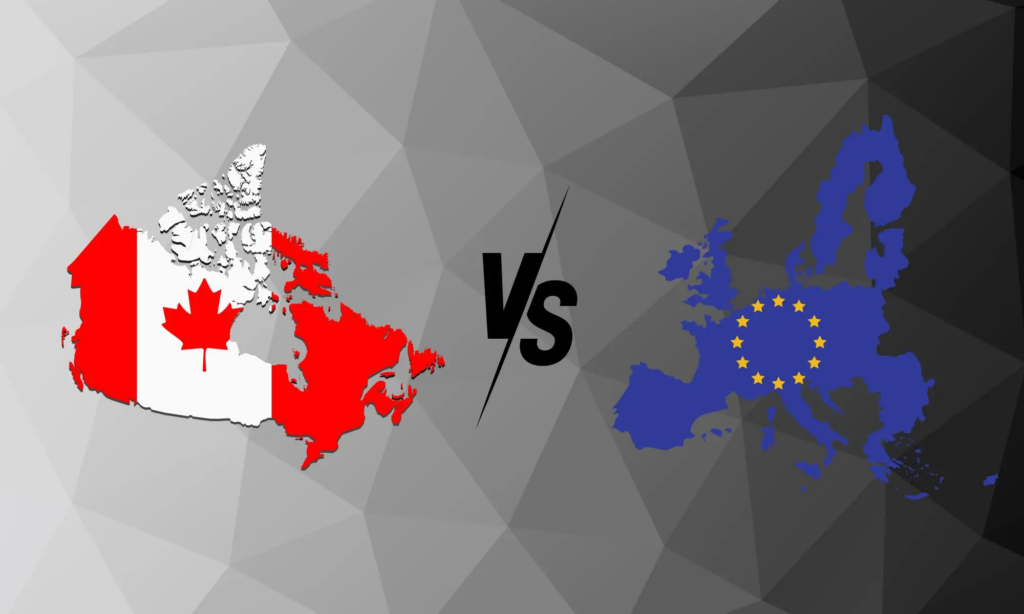
Have you ever wondered how different places protect consumer personal information? There are two big laws in this area: PIPEDA from Canada and GDPR from Europe. But how are they different? In this article, we’ll look closely and compare PIPEDA vs GDPR.
We’ll cover what they mean for businesses, especially when keeping personal information safe. Also, get permission and follow the rules. It’s really important for businesses that work in more than one country to understand these differences.
Let’s make it easy to understand PIPEDA vs GDPR and how they can protect consumer data.
Key Takeaways
PIPEDA helps keep the personal information of consumers safe in Canada, and the GDPR does the same for the EU.
GDPR needs explicit consent from people to use their data. PIPEDA is more relaxed, allowing opt-out consent, but only for non-sensitive data. Both laws aim to direct businesses to handle personal data safely and correctly.
If your business processes the personal information of Canadians or members of the EU, you need to understand PIPEDA and GDPR. Not following these laws can lead to large fines, so it’s crucial to stay informed and compliant to protect your business and build trust.
What is the PIPEDA?
What is PIPEDA.jpg
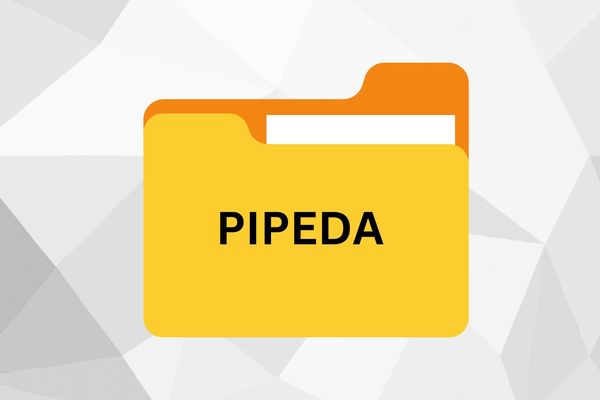
PIPEDA, or the Personal Information Protection and Electronic Documents Act, is a big deal in Canada. It’s a law that helps keep personal information safe when businesses use it. Think of it like a set of rules that businesses must follow when they handle your personal details, especially online.
This law went into effect on January 1st, 2001 and has been updated a few times to keep up with how fast technology changes. It’s all about making sure businesses are clear about what they’re doing with your information and getting your okay before they use it. This is really important because it helps protect your privacy.
One of the main things about PIPEDA is that it gives you rights over consumers’ personal information. For example, consumers can ask to see what information a business has about them and even ask you to correct or delete it. Businesses have to be careful about how much information they collect, why they need it, and how they use it.
PIPEDA applies to most businesses in Canada, but there are some exceptions. If a business is in a province with its own privacy laws, like Alberta, British Columbia, or Quebec, those provincial laws have priority. But in general, if a business is dealing with personal information in Canada, they need to follow PIPEDA.
What is the GDPR?
What is the GDPR (1).jpg
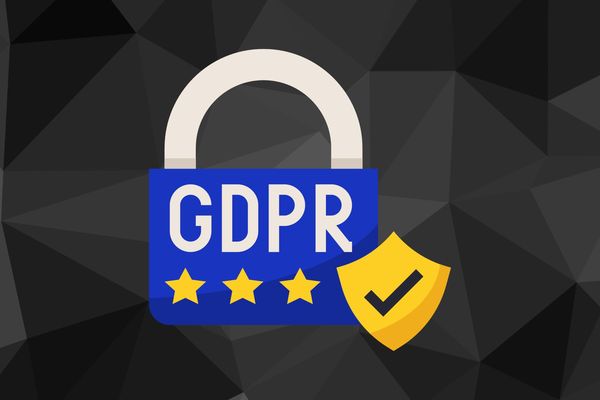
The General Data Protection Regulation, or GDPR, is the largest data privacy rule in the world and protects EU residents’ personal information. It started on May 25, 2018, and it’s known as one of the toughest privacy laws in the world.
Any business that has consumers in the EU or a business that handles people’s personal information in the EU is under GDPR’s provisions. It doesn’t matter where the business is located. If they’re dealing with EU data, they need to follow GDPR.
This law has given people more control over their personal data. With so much of our lives online, it’s really important to keep that information safe. GDPR compliance ensures businesses are clear about what they’re doing with people’s data, including managing cookie consent, and that they have permission to use it.
Here are some key things businesses need to know about GDPR: Businesses have to be really careful with personal data, especially sensitive data. You can only use this data for a defined purpose and need to keep it secure and accurate. If something goes wrong, like a data breach, you will have to tell people quickly.
GDPR also emphasizes explicit consent, particularly in relation to sensitive personal information, meaning businesses must obtain clear permission from individuals before using their data. And if they’re dealing with kids under 13, they need permission from their parents, too.
PIPEDA vs GDPR Differences
PIPEDA vs GDPR Differences.png
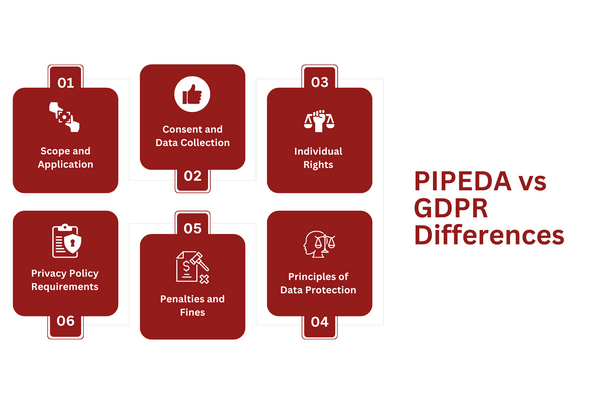
Understanding the differences between PIPEDA and GDPR is crucial for businesses to ensure they handle personal information correctly. While both aim to protect data privacy, their approaches and requirements vary significantly.
Scope and Application
PIPEDA focuses on private sector organizations within Canada. It applies to businesses that collect, use, or disclose personal information during commercial activities. Certain provinces like BC, Alberta, and Quebec are exempted, though.
Additionally, nonprofits, charity groups, and political parties are exempt under PIPEDA.
The GDPR has a wider reach, impacting any business, regardless of location, that processes the personal data of individuals within the EU. This means a business outside the EU, like in Canada, must comply with GDPR if it deals with EU residents’ data.
Certain entities are exempt, like universities, the press, and law enforcement.
Consent and Data Collection
PIPEDA allows for implied consent in certain cases, especially for non-sensitive data. This means businesses can assume consent for data collection unless explicitly denied.
GDPR requires explicit consent for all types of personal data. Businesses must obtain clear, affirmative action from individuals before collecting or processing their data, making the consent process more stringent.
Individual Rights
PIPEDA offers rights such as accessing and correcting personal information held by businesses. However, it’s less extensive in terms of individual rights compared to GDPR.
GDPR provides broader rights, including the right to be forgotten (erasure of personal data), the right to data portability (transferring data to another service), and rights against automated decision-making processes.
Principles of Data Protection
GDPR is built around seven key principles:
Lawfulness, Fairness, and Transparency: This principle emphasizes that personal data must be processed lawfully, fairly, and in a transparent manner.
Purpose Limitation: Data should be collected for specified, explicit, and legitimate purposes and not further processed in a way that is incompatible with those purposes.
Data Minimization: The principle of data minimization means collecting only the data that is necessary for the purposes for which it is processed.
Accuracy: Ensuring that personal data is accurate and, where necessary, kept up to date.
Storage Limitation: This involves retaining personal data in a form that permits the identification of data subjects for no longer than is necessary for the purposes for which the personal data are processed.
Integrity and Confidentiality: Personal data should be processed in a way that ensures appropriate security, including protection against unauthorized or unlawful processing and against accidental loss, destruction, or damage.
Accountability: The data controller is responsible for and must be able to demonstrate compliance with the other principles.
PIPEDA, on the other hand, outlines ten principles:
Accountability: Organizations are responsible for personal information under their control and must designate an individual or individuals accountable for compliance.
Identifying Purposes: The purposes for which personal information is collected must be identified by the organization at or before the time of collection.
Consent: The knowledge and consent of the individual are required for the collection, use, or disclosure of personal information.
Limiting Collection: The collection of personal information must be limited to that which is necessary for the purposes identified by the organization.
Limiting Use, Disclosure, and Retention: Personal information must not be used or disclosed for purposes other than those for which it was collected, except with the consent of the individual or as required by law.
Accuracy: Personal information must be as accurate, complete, and up-to-date as is necessary for the purposes for which it is to be used.
Safeguards: Personal information must be protected by appropriate security relative to the sensitivity of the information.
Openness: An organization must make readily available to individuals specific information about its policies and practices relating to the management of personal information.
Individual Access: Upon request, an individual must be informed of the existence, use, and disclosure of their personal information and be given access to that information.
Challenging Compliance: An individual must be able to challenge an organization’s compliance with the above principles.
So, while GDPR and PIPEDA both want to keep your data safe, they have different ways of doing it. GDPR is very strict about being fair and keeping data safe. Meanwhile, PIPEDA focuses more on making sure you know what’s happening with your data and that you have a say in it.
Penalties and Fines
Under GDPR, the penalties for not following the rules can be really big. If a business doesn’t handle personal data the right way, it can be fined up to €20 million or 4% of its total worldwide sales from the last year, whichever is higher. This means that for big businesses, these PIPEDA fines can be devastating, even warranting the end of the business.
For PIPEDA, the fines are not as high as GDPR. If a business in Canada doesn’t follow PIPEDA’s rules, they might have to pay up to CAD $100,000 for each violation. This is still a significant amount, but it’s generally smaller than the fines under GDPR. PIPEDA often focuses more on fixing the problem rather than just giving out big fines.
Privacy Policy Requirements
PIPEDA requires businesses to be transparent about their privacy practices, including how they collect, use, and disclose personal information.
GDPR demands a comprehensive privacy policy that covers all aspects of data processing, including the lawful basis for processing, data retention periods, and detailed information on data subject rights.
PIPEDA vs GDPR Similarities
PIPEDA vs GDPR Similarities.png
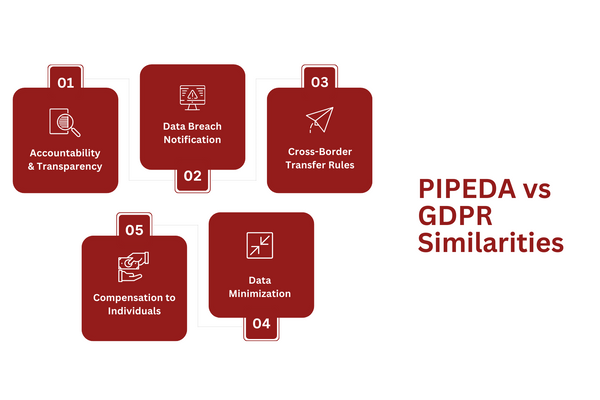
GDPR and PIPEDA are big rules about keeping personal information safe. Both of these rules want to protect consumer personal information. They tell you how you must handle this information.
Even though GDPR and PIPEDA started in different places and have some differing rules, they agree on a lot of things.
Both of them work towards making sure our private information is kept safe, which is becoming more important in today’s world.
Accountability & Transparency
GDPR and PIPEDA both really care about businesses being responsible and open with our information. This means that in Europe and Canada, businesses have to follow special rules to keep our personal data safe. They can’t just use this information any way they want.
These businesses have to prove they’re sticking to these rules. This is about being responsible. They also need to be really clear with us about how they use our information.
This is about being open. So, whether a business is under GDPR or PIPEDA, they need to take good care of consumer data and tell them honestly what they’re doing with it.
Data Breach Notification
In the event of a data breach, both GDPR and PIPEDA mandate timely notification to the relevant authorities and, in cases where the breach could harm the individual, to the individuals affected. This requirement ensures prompt action to mitigate the impact of the breach.
Cross-Border Transfer Rules
Both frameworks have provisions for the transfer of personal data across borders. If a business in Europe (under GDPR) or Canada (under PIPEDA) needs to send consumers’ data somewhere else, they have to make sure it’s going to a place that also protects consumers’ information well.
Data Minimization
GDPR and PIPEDA both advocate for data minimization, meaning that only the data necessary for the specified purpose should be collected and processed. This principle helps in reducing the risk of data breaches and misuse.
Compensation to Individuals
Both laws provide mechanisms for individuals to seek compensation for damages resulting from violations of the data protection regulations. This aspect reinforces the accountability of organizations handling personal data.
Closing
Understanding GDPR and PIPEDA can be a lot, especially when you’re running a business. If you’re asking, “What now? How do I make sure I’m doing this right?” we at Captain Compliance are here to help.
As experts in corporate compliance and data protection laws, we can guide you through understanding and applying these rules in your business. From setting up the right policies to training your team, we’ve got you covered. Think of us as your go-to helpers for all things compliance.
So, if you’re feeling a bit lost with GDPR, PIPEDA, or any other data protection laws, our compliance services, including outsourced compliance and compliance training, are here to help.
We’re here to make sure your business is safe from penalties, follows the rules, and earns your consumers’ trust. Get in touch, and let’s work together to protect personal data and grow your business.
FAQs
What is PIPEDA, and Who Does it Apply To?
PIPEDA is a Canadian law that helps keep personal information safe in businesses. It’s for businesses in Canada, but not all. Some places like Alberta, BC, and Quebec have their own rules. If a business deals with Canadian personal information, they usually need to follow PIPEDA.
Wondering if PIPEDA applies to your business? Check out our easy guides for more details!
What is GDPR, and Who Does it Apply To?
GDPR is a strict law that protects personal information. It’s for any business that deals with data from people in Europe, no matter where the business is. GDPR makes sure businesses are careful with personal data and get permission to use it.
Are you curious about whether GDPR affects your business? Find out more in our comprehensive guide on GDPR requirements and compliance!
How is GDPR Different from PIPEDA?
GDPR is a European law that’s very strict about personal data. It needs a clear “yes” from people to use their data. PIPEDA is similar but not as strict, especially for less private information. A major difference between them is that GDPR requires explicit consent (opt-in) while PIPEDA only requires opt-out consent.
Confused about what opt-out consent is? This guide can help!
What Happens if a Business Doesn’t Follow GDPR or PIPEDA?
If a business breaks GDPR rules, it can be fined a lot, up to €20 million or 4% of the annual global turnover. For PIPEDA, the fines are smaller, up to CAD $100,000 per violation. But both can yield serious consequences for businesses.